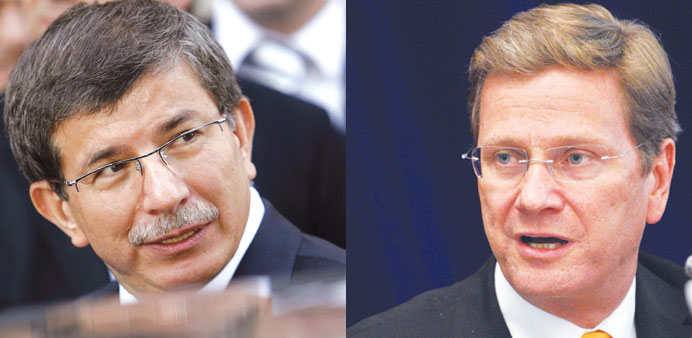|
Germany has proposed postponing a new round of European Union membership talks with Turkey by about four months to signal EU displeasure at Ankara’s handling of anti-government protests. |
The EU had planned to revive Turkey’s EU ambitions tomorrow by opening a new chapter, or policy area, in its EU membership talks – the first opened since 2010.
But Germany, supported by several other EU states, is blocking the plan over Turkey’s handling of anti-government protests that swept its cities after police used teargas and water cannon to disperse a demonstration against redevelopment of an Istanbul square.
Two weeks of clashes with police have left four people dead, including a police officer, and some 7,500 injured.
A delay in opening the new chapter would raise new doubts about whether Turkey, a predominantly Muslim country of 76mn people, will ever be admitted to the European club.
German Foreign Minister Guido Westerwelle said Berlin had given the compromise proposal to Ireland, current holder of the EU presidency, which would discuss it with other EU states.
“We cannot say today if this proposal will fly. We are doing our best to come to a good solution,” he told reporters at an EU foreign ministers’ meeting in Luxembourg.
Westerwelle declined to give details of the proposal, but a German diplomat said it was for the EU to agree now to open the new chapter but to delay holding a meeting with Turkey to launch it until later this year.
The official launch would be after the EU issues its annual report on Turkey’s progress in bringing its laws into line with EU practice and on human rights, due in mid-October.
The proposal would be helpful to German Chancellor Angela Merkel because it would push back the start of the talks until after German elections in September. Merkel’s conservatives oppose Turkish EU membership in their election manifesto.
An Irish official said Ireland, current president of the EU, was reflecting on the German proposal and, for now, tomorrow’s talks with Turkey had not been called off.
The Turkey issue could be discussed by EU ministers who meet in Luxembourg today to decide enlargement issues.
Austrian Foreign Minister Michael Spindelegger signalled strong support for Germany’s stance yesterday.
“We are waiting for signals from Ankara that they are really going to give people in Turkey their rights. They have to think about the behaviour of their police ... there has to be some movement from Turkey before we start negotiations on a new chapter,” he said in Luxembourg.
Westerwelle and Turkish counterpart Ahmet Davutoglu discussed the issue by telephone yesterday.
Turkey and Germany became embroiled in a diplomatic row last week after Merkel said she was appalled by Turkey’s crackdown on protesters.
A senior Turkish official told Reuters last week that a decision by the EU not to open the new chapter would “draw a strong reaction from Turkey”.
Turkey’s Hurriyet newspaper quoted a senior Turkish diplomat last Thursday as saying that Ankara could suspend negotiations with Brussels altogether if the new chapter was not opened this week.
Germany’s hardline stance is causing alarm among some European policymakers who think the correct response of the EU to the Turkish protests should be to engage more with Turkey to support civil rights rather than moving away.
Swedish Foreign Minister Carl Bildt, a supporter of Turkish EU membership, said the bloc had a long-term strategic approach to enlargement that was not subject to “short-term whims”.
“There are always things happening in different countries. We can’t change the strategy of the European Union just because there happens to be nervousness in one quarter or the other,” he said in Luxembourg.
Turkey opened negotiations to join the EU in 2005, 18 years after applying.
The talks have advanced at a snail’s pace. It has provisionally closed just one of 35 chapters or policy areas.
It has opened a dozen more chapters but most of the rest are blocked due to disputes over the divided island of Cyprus or hostility from some EU members.

